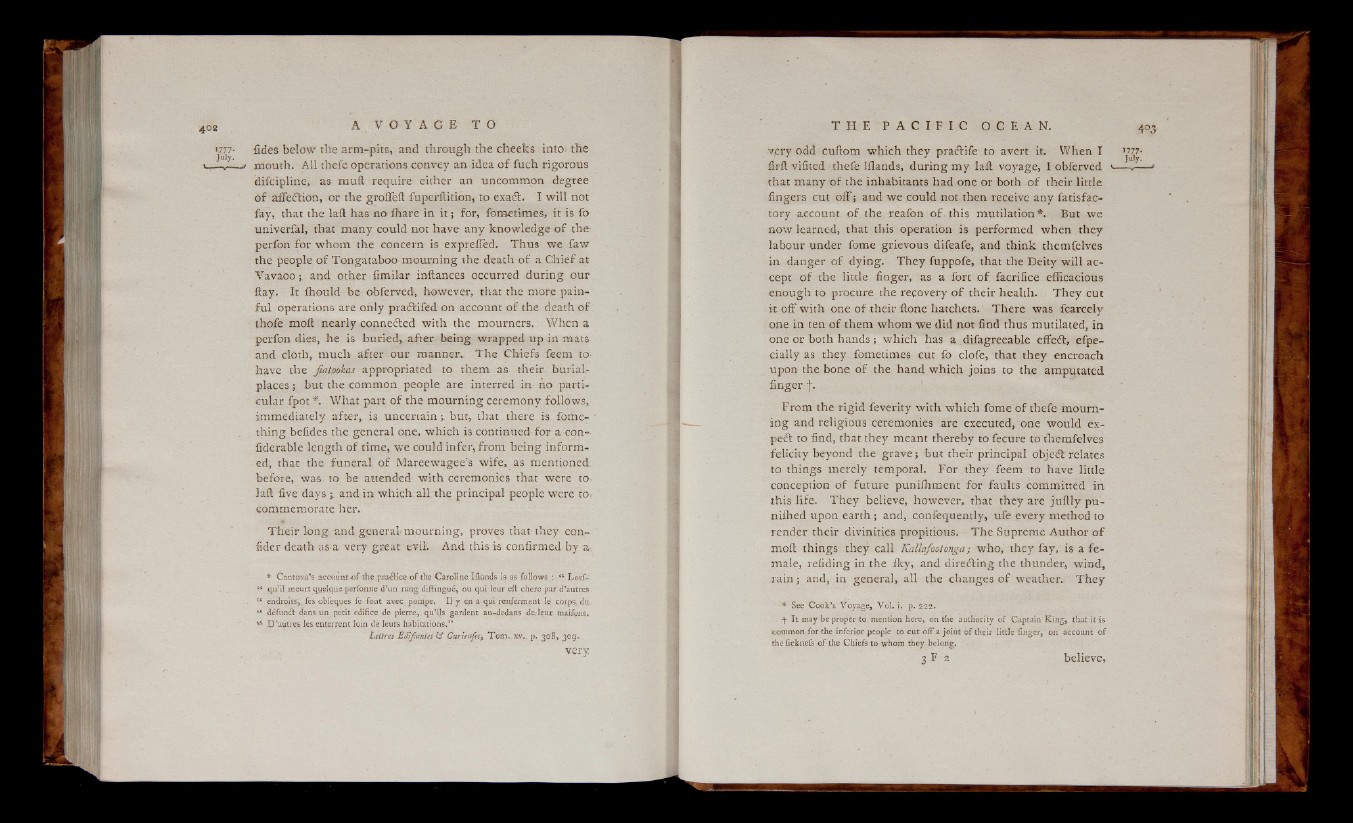
'777- fides below the arm-pits, and through the cheeks into* the
July. . \__ .— j mouth. All thefe operations convey an idea of fuch rigorous
difcipline, as muft require either an uncommon degree
of afieftion, or the groffeft fuperftidon, to exadt. I will not
fay, that the laft has no fhare in i t ; for, fometimes, it is fo
univerfal, that many could not have any knowledge of the
perfon for whom the concern is exprelled. Thus we faw
the people of Tongataboo mourning the death of a Chief at
Vavaoo; and other fimilar inftances occurred during our
ftay. It fhould be obferved, however, that the more painful
operations are only pradtifed on account of the death of
thofe moil nearly connected with the mourners. When a
perfon dies, he is buried* after being wrapped up in mats
and cloth, much after our manner. The Chiefs feem to-
have the jtatgokas appropriated to them as their burial-
places ; but the common people are interred in no particular
fpot S. What part of the mourning ceremony follows,
immediately after, is uncertain but, that there is fome-
thing belides the general one, which is continued for a con—
fiderable length of time, we could infer, from being informed,
that the funeral of Mareewagee’s wife, as mentioned,
before, was to be attended with ceremonies that were to
laft five days and in which all the principal people were to,
commemorate her.
Their long; and general mourning, proves that they cq'n-
fider death as*a very great evil. And this is confirmed: by a*
* Cantova’s aceount-of the jpua^Hee of thie Caroline Hands is as follows tc Lorf-
“ qu’il meurt quelqne-perfonne d’un rang diftingue, ou qui leur eft chere par'd’autres .
- <f endroits,’ fes obfeques fe font avec. pohipe. II y en a qui renferment le .corps, da,
** defun£t dans un petit edifice de pierre,. qu’ils gardent au-dedans de, leur. maifons..
D ’aufre.s les enterrent loin de leurs
Letires Edjfiantes & Gurieufes, Toni. xv>, p. 308, 309.
very:
vpry odd cuftom which they pradtife to avert it. When I
firft vifited thefe Iflands, during my laft voyage, I obferved
that many of the inhabitants had one or both of their little
fingers cut off; and we could not then receive any fatisfac-
tory account of the reafon of. this mutilation*. But we
now learned, that this operation is performed when they
labour under fome grievous difeafe, and think themfelves
in danger of dying. They fuppofe, that the Deity will accept
of the little finger, as a fort of facrifice efficacious
enough to procure the recovery o f their health. They cut
it off with one of their ftone hatchets. There was fcarcely
one in ten of them whom we did not find thus mutilated, in
one or both hands; which has a difagreeable effect, efpe-
cially as they fometimes cut fo clofe, that they encroach
upon the bone of the hand which joins to the amputated
finger f.
From the rigid feverity with which fome of thefe mourning
and religious ceremonies are executed, one would expect
to find, that they meant thereby to fecure to themfelves
felicity beyond the grave; but their principal objedt relates
to things merely temporal. For they feem to have little
conception of future puniffiment for faults committed in
this life. They believe, however, that they are juftly pu-
niffied upon earth; and, confequently, ufe every method to
render their divinities propitious. The Supreme Author of
moft things they call Kallafootonga; who, they fay, is a female,
refiding in the iky, and directing the thunder, wind,
rain; and, in general, all the changes of weather. They
* See Cook’s Voyage, Vol. i. p. 222.
f It may be proper to mention here, on the authority of Captain King, that it is
common for the inferior people to cut off a joint of their little finger, on account of
the ficknefs o f the Chiefs to whom they belong.
3 F a believe,